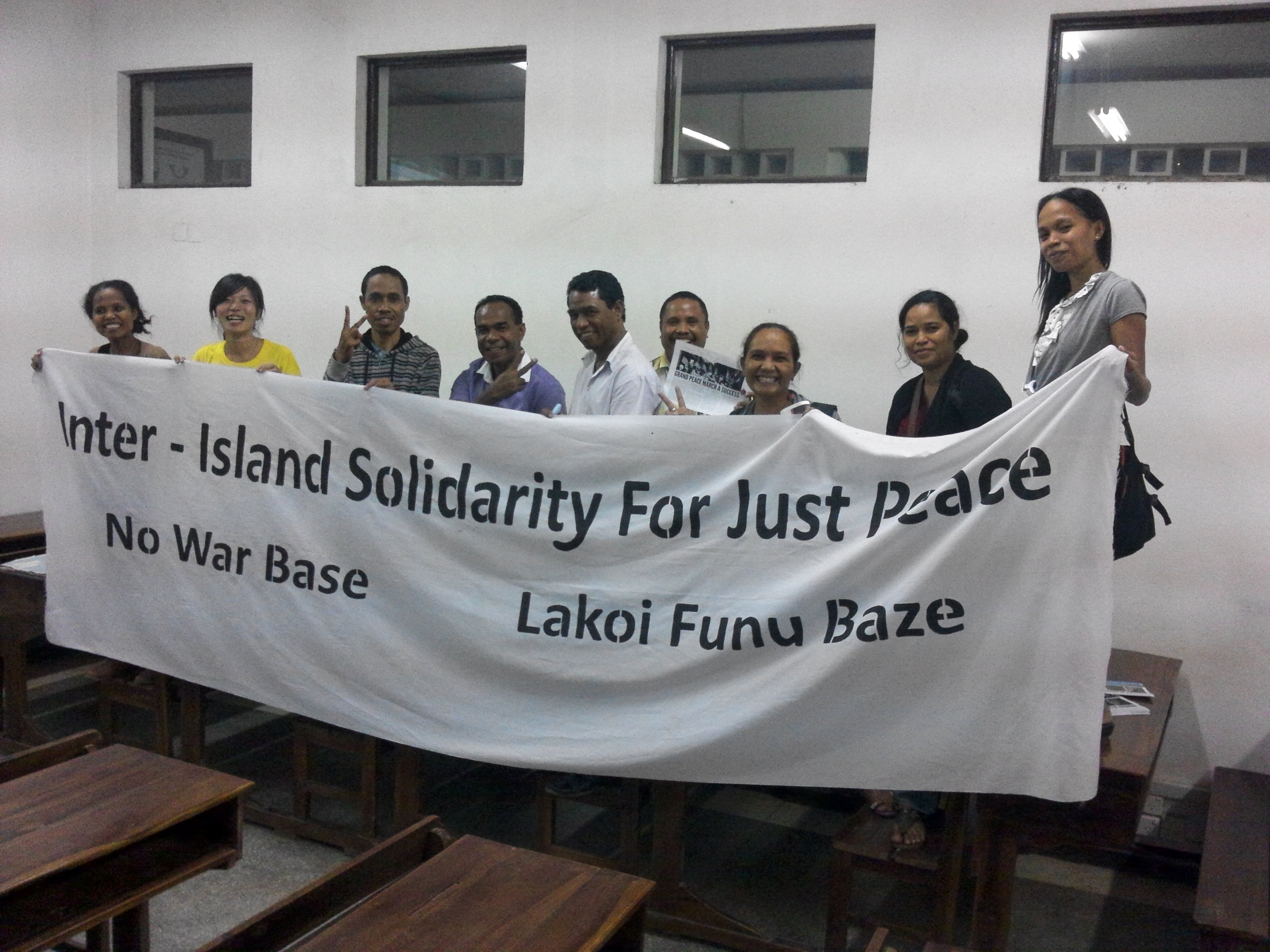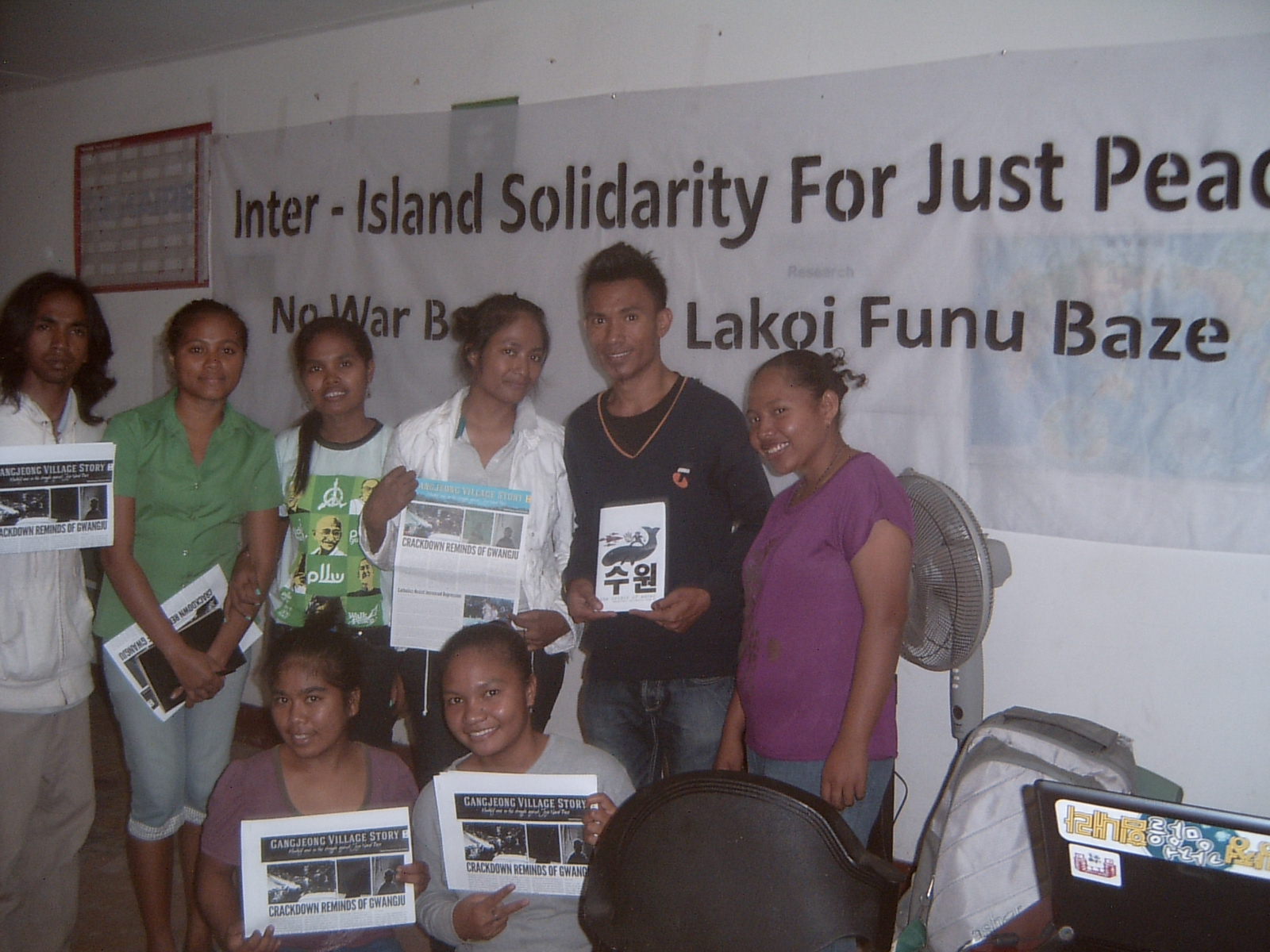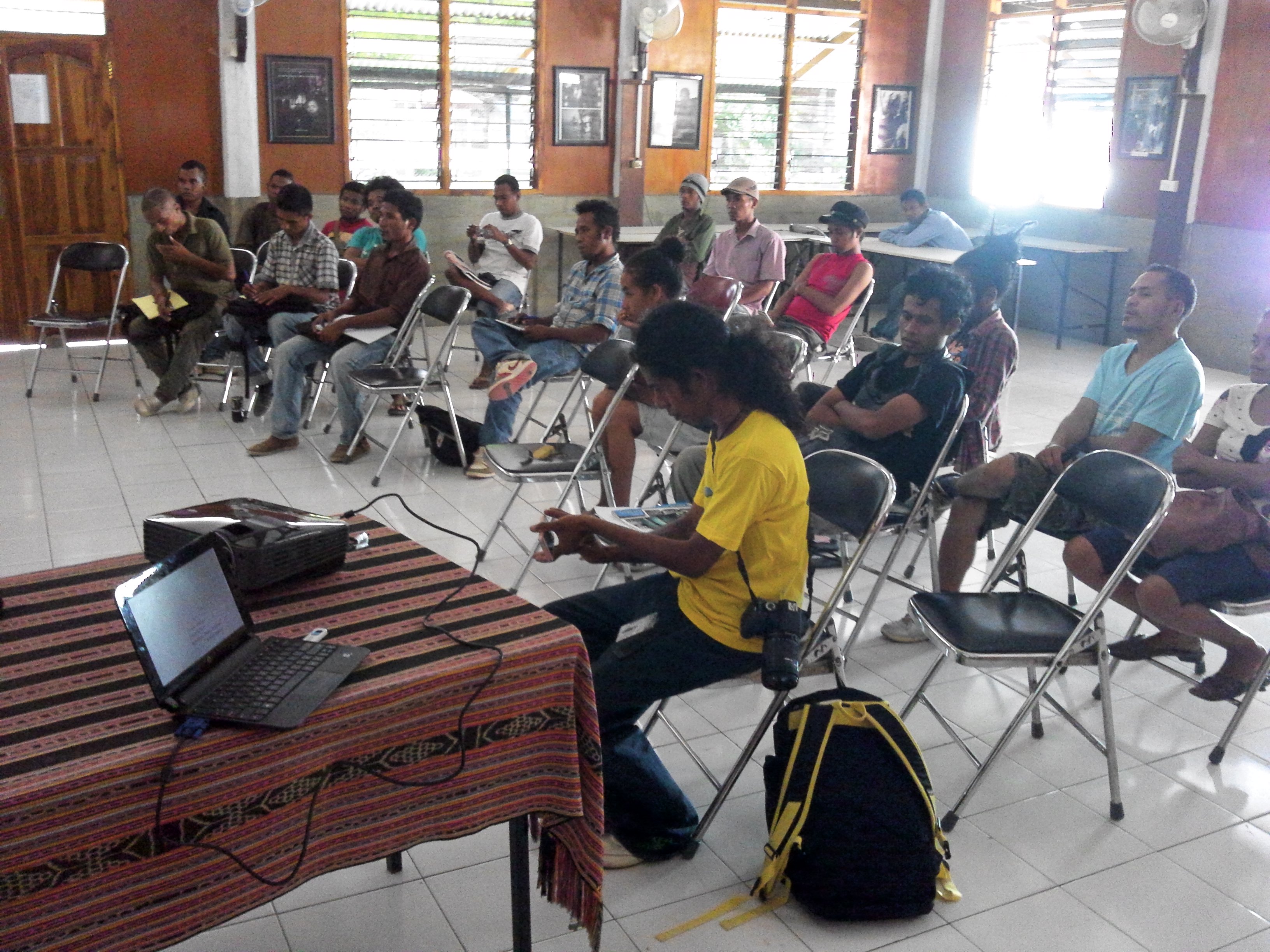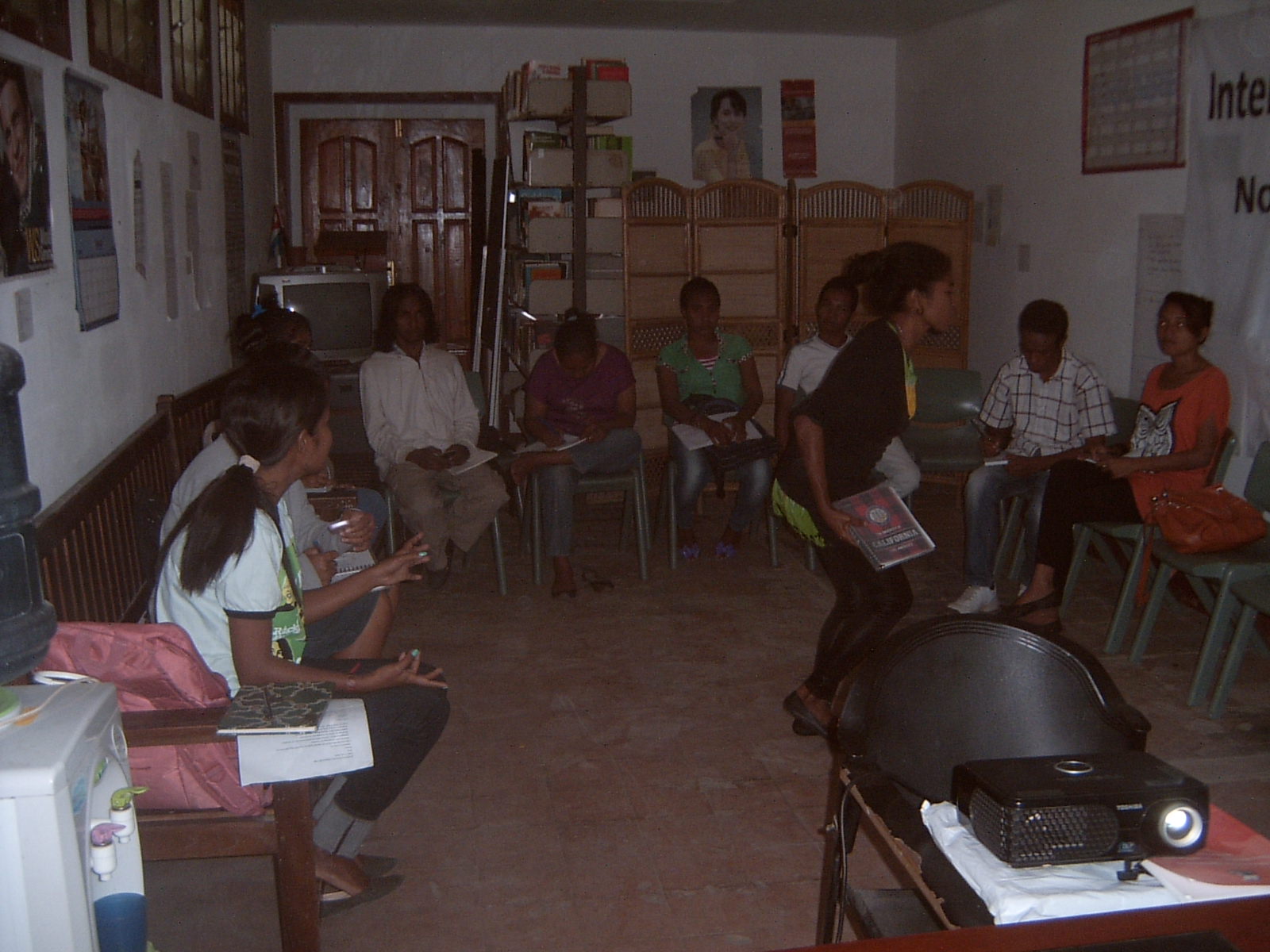Emily, the Deported Gangjeong Peace Activist, has just visited Timor-Leste to share (1) the Gangjeong’s struggling stories and through this sharing, she also talked about (2) the ideal of Inter-island Solidarity for Just Peace.
This video, Gangjeong in 2012, is translated into Tetun, the most popular language in Timor-Leste, and was used in the sharing in Timor-Leste.
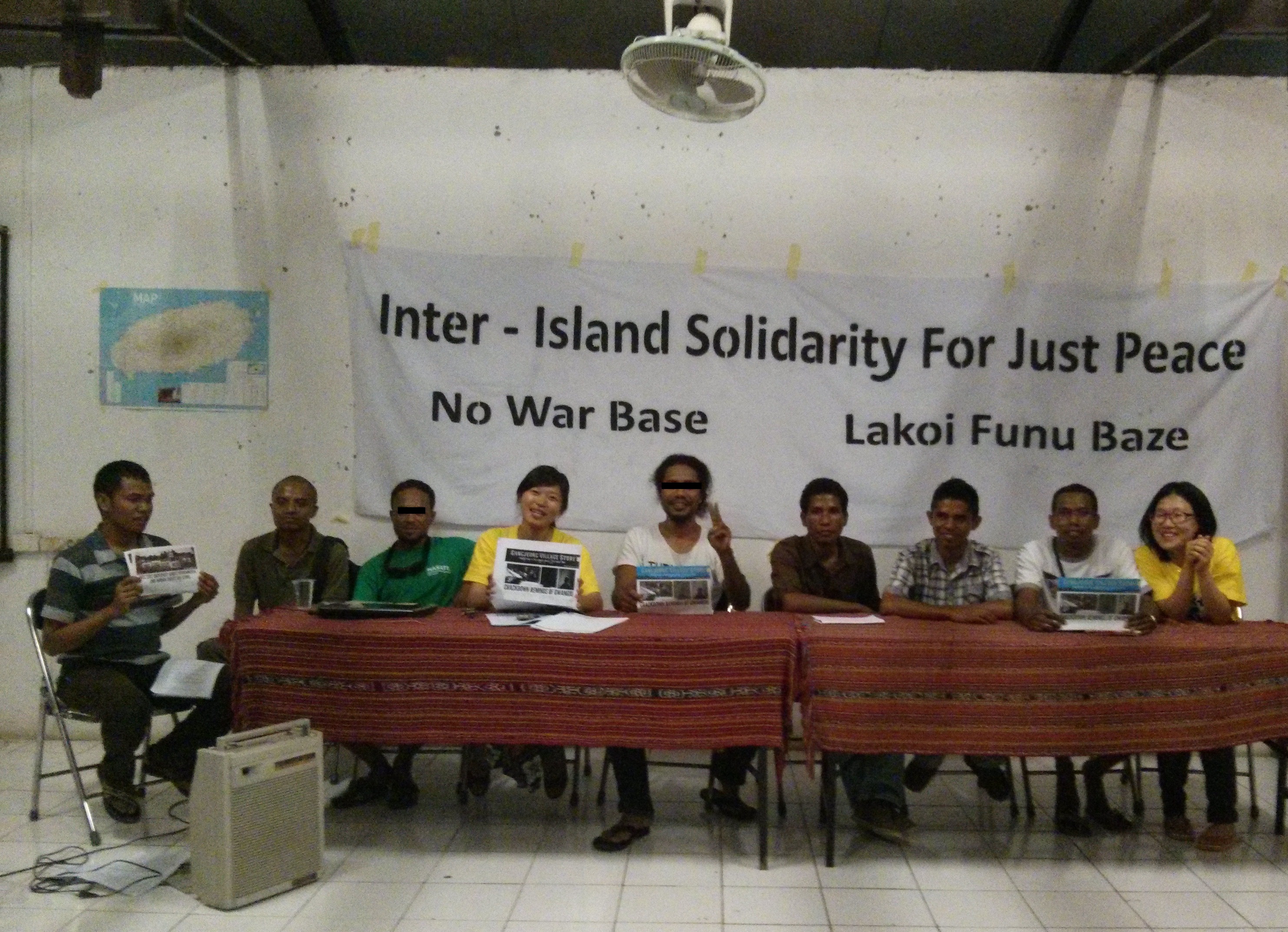
From this visiting she also learned that the American navy has tried to take the Atauro Island of Timor-Leste to be its naval base, but so far, not yet succeeded to persuade the government of Timor-Leste. This is an alarm for the newly-independent country Timor-Leste in this trend of islands’ militarization.
Emily met the Human Right Group, Group of Women Peace and Leadership, and the university students and graduate students in the University of Timor Lorosae. These Timorese friends were really amazed by the ongoing struggle of Gangjeong and be more aware about the issue of the militarization in lots of islands.
The following is Emily’s speech especially on inter-island solidarity for just peace in Timor.
——————————————–
Dear friends of Timor,
I am Emily Wang, a peace worker from Taiwan but I have ever worked in Timor island, Jeju island and Taiwan island. Today I am especially happy to be in Timor-Leste again as Timor is where I started to dream to be a peace maker.
Among the places where I have ever stayed and worked for quite a while, there’s one obvious common element. Is there anyone noticing about it?
Yes, Jeju, Taiwan, Timor all of them are island! But today, I will more focus on the island in North East Asia, including Taiwan, my hometown, and Jeju where I’ve lived for almost 2 years, and Okinawa. Even though I haven’t got chance to visit Okinawa for deeper understanding, many Okinawa people have visited Gangjeong and shared their stories. These three islands are geographically close to each other, and thus when we review the island history by viewing the interaction or relation between these islands and other big powers, you may also get some clue about the reason why I and my co-workers are working to contribute for inter-island solidarity for just peace, and then hopefully, from my sharing, there will be some seeds to grow in the future among us.
Not until my life journey was trapped in Gangjeong, I have been forced to realize and learn lots of hidden stories in the history I used to learn. You know what I am so much surprised that I’ve never realized about Taiwan and Korea’s connected past and present, and I can say most people in Taiwan or Korea haven’t got chance to realize it. Actually, we don’t learn the Korea and Japan’s history in our compulsory school education. Only if the Korea or Japan appeared in the history of China, then the book may have some space for that incident. The history student learned in school in ROC (Taiwan), ROK, and Japan are written on the unnaturally isolated basis of state. Which means we are forced to view our history on the isolated basis of state, and unconsciously, we are divided unnecessarily. The stories which I should have noticed are stolen by an invisible hand.
For I started to realize that, I was motivated to study about the missing history from a missing angle, and I will bring you to a quick history journey in our region through the angle of Island.
For the presentation in Timor, I made the form to compare the history of islands. Thanks for you guys! Because the desire to share our history with you gives me a chance to learn again my history and I just realized a lot of parts of histories before I came to Timor!
| Taiwan | Jeju | Okinawa | Timor | ||
| In the past, independent island with diverse indigenous people’s tribal culture. Some Han people immigrate to Taiwan.Colonization by Dutch, Spain, and then Chinese regime with lots of Han people’s immigration to Taiwan. | In the past, independent island regime until 12, 13 century, swallowed up by mainland.In the long time ago: battle ground of big countries (China, Japan, Korea, Mongolia…) | In the past, independent island regime. Tributary state to China. In 1609 Satsuma from Japan invaded Okinawa, then Okinawa deftly served both China and Japan.Diverse culture: local culture plus big influence from China and also Japan. | 16th century, Portuguese came17th century, Dutch came. West Timor and other island colonized by Dutch between 17th-19th were known as the Dutch East Indies. | ||
| Japan imperialism’s colonization(1895-1945) | Japan imperialism’s colonization(1910-1945 ): | Japan imperialism’s colonization(1879-) | Japan imperialism’s colonization (1942-1945) | ||
| During war time: Kominka movement(Assimilation policy and a campaign to totally transform the Taiwanese, Okinawa people and Korean into loyal subjects of the Japanese Emperor between 1937 and 1945.) | |||||
|
Island colonies to be militarized, to be exploited for the war preparation and to be used as bases and then victimized |
|||||
| Towards the end of World War II, Taiwan as the colony of Japan became the target of Allied, for example, Taipei Air Raid. The number of deaths totaled more than 3,000, Tens of thousands of people were displaced or became homeless, and many buildings were destroyed either by the attacks or by the fire caused by the attacks. After the conclusion of World War II, because of its pro-American political stance, the government of Republic of Chinatoned down the attack and excluded it from the media and history textbooks. | Towards the end of World War II, the Japanese heavily fortified the island, deployed 70,000 soldiers, and forced the islanders to construct coastal defenses in anticipation of a U.S. invasion. | Towards the end of World War II, the Japanese fortified Okinawa in hopes of thwarting the Allied advance on mainland Japan. U.S. forces, prior to Hiroshima and Nagasaki, saw Okinawa as an ideal location from which to launch potential ground and air attacks against Japan.Okinawa experienced the only ground battle in Japan during World War II. Lots of Okinawa people died and dislocated, lot land… | |||
| The end of World War Two:- The end of Japanese colonization- Expectation to build up a new society but… | The end of World War Two:- The end of Japanese colonization in both Korea peninsula and Jeju.- Expectation to build up a new society but… | The end of World War Two:- expectation to build up a new society but… | The end of World War Two:- 1945, Portuguese Timor | ||
| – Civil War in China- KMT’s exploitation was like a second colonizer. – In 1947, 228 Massacre – 1948 KMT government launched martial law, Pro-US military dictatorship was establishe– 1949 KMT lost civil war and retreated to Taiwan._ 1950 Korea War broke out, and US Seventh Fleet was send to Taiwan Strait | – Soviet Union and US occupation of north and south Korea – North Korea government firstly built in 1945 but US dislike it. In 1948, with U.S. and U.N. support, South Korea held elections that established a separate Pro-US government in the south, thus solidifying Korea’s division. – In 1948, 43 Massacre | – Occupation by US military- Under the impact of Cold War, the budget for US base construction in Okinawa was passed.- The United States would administer Okinawa but its inhabitants would retain Japanese to svoid criticism of colonization which is good for Japan and US
– The Okinawa people started movement to be returned back to Japan |
– ? | ||
|
– Cold War |
|||||
| – Since middle of 1950’, all the military bases in Taiwan provided for US military to use, especially during Vietnam War (1965-1971), around 20,000 US soldiers stationed in Taiwan.- Since 1967, Taiwan was designated as a holiday place for US Army.- White Terror- Economic growth because of War | – Because of Cold War, lots of US army and base in Korea.- Korean army also sends to Vietnam war…- White Terror- Economic growth because of War | – Important US base during Cold War- 1972 US relinquish Okinawa to Japan but the base remains. It shows Okinawa’s victimized role in the US-Japan Security Relationship. Okinawa people realized returning back to Japan is not the point, but military base is the point to fight.- Impoverished by US military administration and started “Base economy” which means islanders relied on the base to survive as the original way of living was destroyed. | – In 1974, after the fall of Portuguese fascist regime, independence was encouraged by the new democratic Portuguese government.- legalise political parties in preparation for elections to a Constituent Assembly in 1976.- Fretilin was criticised by many in Australia and Indonesia as being Marxist. The United States had also expressed concerns over Portuguese Timor- 1975 Indonesia Invasion | ||
|
China Growth or China Threat / How to face China and how to face each other in our region where the decolonization process was intervened through violence? By holding US’s military hand, we don’t need to face each other! |
|||||
| – 1971, ROC(Taiwan) was kicked out from UN- 1979, US Taiwan Relation Act (US continue to sell weapon to Taiwan and promise Taiwan that in Emergency situation to secure Taiwan)- Taiwan is in a weird situation… (for example: buy the weapons from US and support the US’s war even contributed to the killing in East Timor…)- China and US both cannot tolerate Taiwan to be militarily used by each other, | – US base in Korea’s function is not only for North Korea but largely for China.- Relocation of the base in Korea for the strategy flexibility (eg. Pyeongtaek base)- Jeju Naval Base | – US base in Okinawa’s function also for China | |||
| President Obama: Asia Pivot (Rebalance the US focus to the Asia pacific area)- Islands in Asia Pacific area will be more highly militarized- Missile Defense System – an important part of America’s first strike strategy. It serves as a shield for US to prevent the retaliatory action if the first strike were launched.- Who are the targets?# Russia owns the richest natural gas provision and a large portion of the petroleum# America is getting difficult to compete with China economically. How to control China’s economic engine? China imports over 60%’s petroleum through the shipping.- Korea, Taiwan, Japan are all part of the MD system, and the MD system’s Aegis Warship will be stationed in Australia, Japan, Guam, South Korea. Jeju island will be the naval base with Aegis Warship. | – How about Timor-Leste?- Are you safe?- Atauro’s future? | ||||
Before the world war two, many of the people in East Asia had been experiencing a common struggle against the imperialism. But after world war two, the common struggling against imperialism was split into two under the cold war. During the World War Two, Islands like Taiwan, Okinawa, and Jeju were unwillingly militarized as the colonies of Japan, but these victimized islands were attacked by America military, the Allied, for attacking the mainland of Japan.
After the World War Two, no time and no need to face peace and justice issue in our region as all of us have to face the cold war together with the US. During the cold war, dividing and dominance in our region was the strategy of US. North East Asia was divided into two sides, and to foster the side of the US partners in our region during Cold War, the Pro-US governments were demanded by the US. That’s why the US installed a new Pro-US government in South Korea and contributed to the division of Korea. And also for US’s interest, the partner countries of US had better to be stabilized to be the US side. Thus, the Pro-US government must have the ability to eliminate the different voices, so the US backed up the Pro-US government’s bloody dictatorship by supporting lots of weapons and military, and money!
Under that background, Pro-US military government in Taiwan and South Korea both suppressed the decolonization effort with the excuse of anti-communist, and the people in Taiwan and Korea both experienced the massacre, 228 massacre and 43 massacre in Taiwan and Jeju, which was both stigmatized as communist rebellion but long time later after both Korea and Taiwan ended the White Terror Era and went on democratization process, both truth of 228 and 43 incident were disclosed more and more.
For the effective social control, in South Korea, the US military and Korea dictatorship even worked together with the Korean vested interests who had served for Japanese colonizer to exploit the other poor Korean. So after world war two, these people back to their power again but this time, worked with US and Pro-US dictatorship to continue the strict social control for the reason of anti-communist.
In China, the KMT government lost the civil war in mainland China and retreated to Taiwan, Taiwan Strait between China and Taiwan become the Cold War dividing Line. One thing to notice is that the whole Taiwan island before the world war two was the colony of Japan, and after the war, Taiwan people experienced a very short cerebration and expectation of emancipation, and then got very much disappointed by KMT government as the Taiwan people were just again became the second citizen of government from mainland and the “self-governance movement” which has started since the Japanese colonization time got suppressed again by the KMT dictatorship government.
(One thing to notice is Korea and Jeju were all fell into the Japan’s colony together but Taiwan alone were given to Japan by Ching dynasty in 1895 after a lost of war between China and Japan, therefore during the World War two while China fought hardly against the Japan’s invading, Taiwan people were Japan’s colony second citizen, and Taiwan island was a land to be exploited for Japan’s imperialism war against China and other countries.)
At the moment when Taiwan’s people who settled down in Taiwan before the 1945 haven’t adapted themselves as “Chinese” yet, and then the Pro-US KMT dictatorship government made them feel they are not equal with “mainland Chinese” but second citizen again as “Taiwan Chinese”, and make Taiwan people thought that Japan and China are actually the same as colonizer. Some even hate KMT more.
There’s one more thing to notice here, when I mention “Taiwan people”, it means diverse group of people who live in Taiwan and other small island governed by Taiwan’s government now.
And the KMT’s lost of Civil War and retreating to Taiwan along with lots of immigration from mainland, due to the bad governance of KMT, these new immigrant people after World War Two had long been called as outsiders (people from other province, people who are not from Taiwan province), a discriminating calling mainly resulting from the dissatisfaction of decolonization and emancipation process. Except for the above-mentioned Han people, there’re indigenous people, the most discriminated group, became under the KMT’s governance. The indigenous people are not Japanese, not Chinese, so even in the emotional feeling, to be “returned” back to Chinese government is not a “returning” but simply just a new colonization by a dictatorship KMT government, for them, a worse colonizer than Japan.
In Japan, under the US military power, a pro-US and anti-communist government was built up too. Japan became US’s partner in cold war system, and it froze the Japan’s society to face the decolonization historical issues as an imperial colonizer and an invader in our region. This gave the militarism in Japan a big chance to be revitalized even after the disastrous war experience.
Okinawa, an originally independent kingdom having a diverse exchanging relationship with both China and Japan, became the imperial Japan’s territory in 19 century. And during the World War Two, due to Okinawa’s geo-graphical importance, Japan highly militarized Okinawa island, but still US military succeeded to take over Okinawa to make it an important jumping step to attack the mainland Japan. Thus, Okinawa being victimized by the powerful countries and experienced a bloody ground battle by US and Japan. After World War two, for its importance and convenience of military, Okinawa was continued to be occupied and directly governed by the US military but remained as Japanese citizen, a deal between US and Japan for their state interest. Okinawa, the only place experiencing the ground battle in world war two in Japan, again was sacrificing for the mainland Japan who enjoyed a peace constitution after world war two. During the US military governance period, Okinawa people never stopped struggling against the US military and US base, and thus the movement to return Okinawa back to Japan began in this background. Finally, Okinawa was “returned” back to Japan’s governance in 1972, but the US base remained, which made the movement to “return Okinawa to Japan” an ironical movement.
US intervention frustrated the decolonization process in our region, makes our common struggling history against imperialism to be forgotten, and also make our region still one of the most highly militarized regions in this world and unfortunately, I have to say our region is still invisibly governed or colonized by the US and imperialism but not so many people realized that.
After the introduction of the historical background, I would like to ask you to think of the history background I just shared, and put one more geographic factor- island-into your mind.
As islands, when we face the same big stream of the world, the same stream gives us, the islanders, and the mainlanders some different impact and experiences.
In the history, Taiwan, Jeju and Okinawa all had its own unique and independent culture. Even though the islands have certain degree of the cultural consistence extended from the Mainland, or Big Island due to the exchange and immigration, the unique island culture and geographic condition makes the islands the region distinct from the land but the difference was not often recognized or respect by the government from the mainland or super powers.
In many cases, for the mainland or the big island, the islanders are forced to sacrifice, to be abandoned or be treated differently as second citizen. In the past, each isolated islands faced this common fate but struggled individually and lonely with limited support from outside. In our region, all of us experienced the westerners’ imperialism and many of us experienced the westernized Japanese imperialism. However, as the islands, we usually faced double discrimination and were triple victimized by both the colonizer and from our culturally related mainland.
Actually for myself, to be an islander, to be given a chance to stay around the island, and to be a peace worker, I think the so-called isolation of island is not “isolation”, but the selfish imperialism state has given us the real feeling of isolation. In the past, the ocean embraces us but not isolated us. However the countries, the borders, the capitals, the imperialism isolated not only the islanders but also the mainlanders as we are all isolated from a possible way of peace.
Today, the growing tension surrounding lots of small islands related to the exploitation of natural resources in the sea brought the islands again to become a battle fields for the human’s greed. The government talked about “national security” but the militarization had brought the islanders a very in secure environment in the history. To talk about security in the way of militarization, the island will always be a jumping step of one super power to attack the mainland or another super power. The peace will never come through this way because the imperialism super power’s core value is not peace but national interest, and in fact, the vested interests’ interest. Peace obtained through force and violent means is not sustainable and in time will be forced to surrender to a larger force or power. The just peace can only be sustained through peaceful means and through our strong solidarity with each other. This kind of peace is the only way for the small islanders to survive and to preserve our island instead of relying on the militarized means which impoverished lots of islands already in the world.
Comparing to big mainland or big island, we are small islanders, very small, and very divided right now, so I strongly suggest that inside our own island, we should motivate people to foresee their possible future to be militarized or to be threaten by militarized states, by realizing this possibility, and by feeling the suffering of others, we should motivate people to demilitarized their island in advance and to make an international solidarity with other islands who are struggling to walk in front to be a Peace Island.
When I was in Gangjeong village, I met an international peace activist whose name is Angie Zelter. She came to Gangjeong shortly but did her best to support the Gangjeong peace movement. She joined to the SOS team’s action to go inside the seashore rock of Naval base, called Gureombi, and in front of lots of people and lots of police, she cut the barbed wire which prevent people from entering into the base. Finally, and not surprisingly, she was deported from Korea. There’re many internationals who got deported from Korea including me. But why do I especially mention Angie Zelter in this speech? Anyone knows the answer?
She has been contributed for lots of non-violent direct peace action and among them, there’s one peace action closely related to Timor Island. In 1996 she was part of a group that disarmed a BAE Hawk Jet, ZH955, causing £1.5million damage and preventing it from being exported to Indonesia where it would have been used to attack East Timor. I am really thankful for these inspiring people’s effort to make someone’s struggling in somewhere not alone. It inspires me.
I think as an island peace activist, when we struggle against the militarization which happened in our island, what we are doing is actually earn a chance to let the world peace begin from us. However, to be a more responsible island peace worker to realize the real world peace, we have no choice but contribute our best to the inter-island solidarity for just peace as we should not let any other island which has no tradition of fighting against militarism to receive the military base after our success. No matter the military base or other unjust thing which the mainland wants to dump to the islands should not just move from one island to another weaker island. If so, then, we cannot call it’s a victory of peace because our struggling is not NIMBY! Our struggling is for Just Peace. Not in my backyard and also not in your backyard because we are brothers and sisters!
Through encountering Gangjeong and experiencing deportation by the Korea government, the invisible imperialism and state violence appeared vividly in front of my life. When I faced Entry Denial in the incheon international airport in Korea, I remembered the immigration officer said to me: “Don’t blame us, if it’s Taiwan, the government will do just exactly the same thing to someone like you. Your government is the same.” Exactly, I agree with that immigration officer, so now the story should not just be about Gangjeong or Korea.
Not only Jeju island, but all the islands should not be victimized as part of the military chain to contain the big land, but the island can be an inspiration for the big land or big island of possible progress on world peace when we don’t leave each other alone on the way of peace. I believe People’s friendships are the most important and reliable basis of sustainable peace not a military base. So again, I am so happy to come back Timor, an island like a friend for me, to share my experiences. Since the Timor also face the danger to be militarized and to be semi-colonized again by the militarism after the hard struggle for independence, I hope my speech will help us to walk the way of Peace altogether. Thank you so much for listening my sharing.
